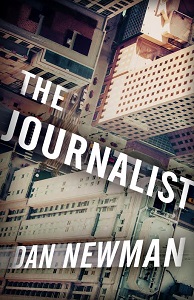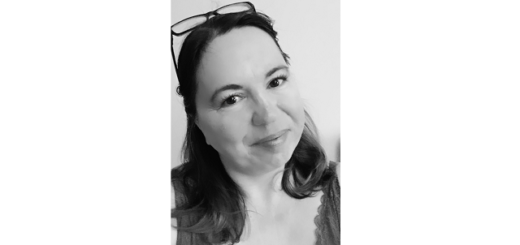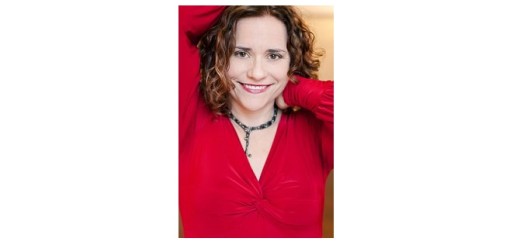The Writing Life of: Dan Newman
Dan Newman
This week on ‘The Writing Life of:‘ I am thrilled to be interviewing author Dan Newman. Dan will be sharing with us detail of his writing life, telling us all about his latest book ‘The Journalist’, which was released on 20th June 2017, and answering a few fun questions too.
So without further ado I’ll hand you over to Dan. Post contains affiliate links.
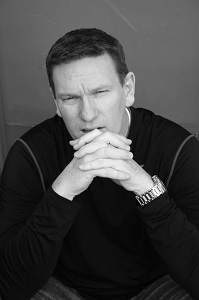
Dan Newman counts his having been raised “in-transit” around the globe as his most valuable education – despite a Masters degree in Journalism.
The son of a globe-trotting international development worker, Dan grew up in St. Lucia, Lesotho, Swaziland, England, Canada, and Australia. Ask him where he comes from and you’ll get a puzzled look, but it’s left a love of travel, writing and far-flung places.
He now lives with his wife and son just outside of Toronto, Canada.
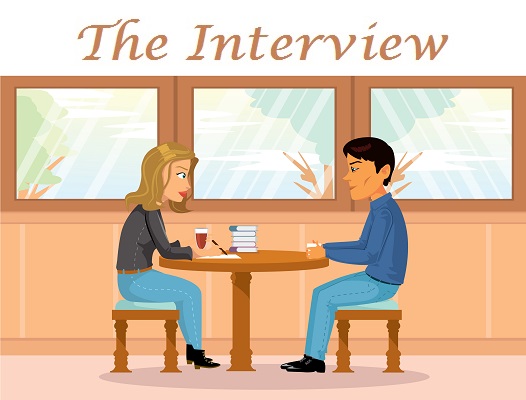
1) As a child what did you want to do when you grew up?
I just wanted to be better than my older brother at anything. Anything at all.
2) Who were your favourite childhood authors?
Early on it was anything with the Hardy boys – so that would be Franklyn W. Dixon. I remember learning later on that that was a pseudonym for a bunch of folks penning the series, and feeling pretty crestfallen. Later on as a teenager, it was anything by Wilbur Smith.
His early stuff is hard to beat – even today. It fit in terms of my context, I suppose. A lot of it was set in Southern Africa, where I lived at the time, but all that aside, there’s few people that can write excitement into a page that well.
3) At what point in your life did you realise you wanted to be a writer?
I think I always wanted to write, but it wasn’t until my late 20s that I actually felt confident enough to take a stab at an actual novel and send it out.
4) How did you go about following that dream?
I got used to disappointment really fast. Lot of rejections – just like everyone else, I guess – but when I started it was all based on actual mail, so the pain of the rejection letter, or at least the anticipation of it, lasted months. After a while you figure out how to let those rejections bounce off you, and let the more positive responses buoy you up.
The lesson learned in the submission process is persistence. That and working at being a better writer.
5) What is your writing day like? Do you aim for a certain amount of pages or words before you stop for the day?
Trying to write every day is important. The word count itself isn’t something I pay much attention to. I find that once I’ve discovered something interesting to work on, not getting to write on a given day is like walking around with the stone in your shoe. It grates on you, so getting your hind quarters back in the chair is always on your mind.
If I can punch out a paragraph that feels real, I’m happy, and if that paragraph turns into a page in that same session, all the better.
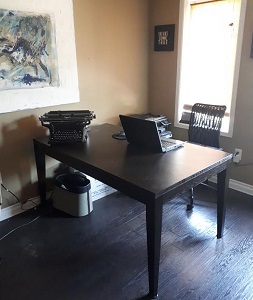
Where Dan Writes
6) Did you ever consider writing under a pseudonym?
No. I’m responsible for what I put out there. Good or bad.
7) Do you have any strange habits before starting, or whilst in the midst of writing?
My watch needs to be to the left of the laptop before I start. If it’s on my wrist, I can’t get rolling. No idea what that’s about, but I have to put it there. And if I forget and start writing while it’s on, the two or three sentences I put down on the page have got to go. Yeah. Even I think that’s weird.
8) Do you write longhand, typewriter, or on a computer?
I like to honour the greats so I use an ostrich quill, parchment and ink I make at home from pressed blueberries. Actually, I use a laptop. I tried dictation software, but it doesn’t work with the way my mind processes things. I think the act of writing helps me focus what I’m trying to say.
9) How many books have you written? Do you have any unpublished work?
I’ve now had two books published conventionally (The Clearing and The Journalist), plus a short story released recently as a free download by my publisher (And With The Shadow People Be). I have several other manuscripts finished (about five last count), most of which were written early on, and while I think there’s some good stuff there, most require a re-write.
10) Are you a plotter or a pantser?
Pantser. Knowing the plot at the outset means there’s no fun in writing the book. At that point you’re just transcribing events that have already played themselves out to you. No – for me, finding out where all this goes is what makes the writing of it so engaging.
11) Do you read all the reviews left for your book(s)?
I do tend to read the reviews. I’m no J.K. Rowling, so I can get to most of the reviews in terms of quantity. In terms of handling them, I do the only logical thing you can: I accept that the positive ones are written by level headed thoughtful people, and that the bad ones are written by escapees from mental asylums.
Concerning your latest book:
Publisher – Diversion Publishing
Pages – 300
Release Date – 20th June 2017
ISBN 13 – 978-1682308103
Format – ebook, paperback

In the middle of the night, in war-torn Rwanda, journalist Roland Keene leaves his hotel to find armed rebels to interview. Some would call it a suicide mission. Roland would agree.
Keene has started at the bottom, living paycheck to paycheck, running from the bookie to whom he owes this and next month’s rent, and trying to make his mark at one of his shining city’s great papers. With no big breaks coming his way, though, Keene decides to make his own. He orchestrates a robbery–one designed to cast himself as the hero–but it goes all wrong and turns into a high-profile murder.
Despite everything, Keene’s role as a “white knight” gets him favor with the victim’s father, and a foot in the door of the newsroom. Immersed in the cutthroat world of investigative journalism, he breaks another story–this one of citywide corruption–but also starts accumulating powerful enemies among his colleagues.
Though Keene’s work as a foreign correspondent keeps him on the road–and at arm’s length from his problems–it doesn’t stop him from being hounded by the people he betrayed on his way to the front page. What will happen to the great Roland Keene if his crimes are revealed, and to what lengths will he go to ensure his secrets never see the light of day?
12) How long did it take you to get from the idea’s stage to your date of publication?
For The Journalist, Probably 2 years.
13) How did you come up with the names for your characters?
At least one is a coded nod to a good friend of mine – hello Mr. Sudbury – but most of them just show up on the day. The best name I ever came up with for a character is in a yet-to-be-published manuscript I wrote called The Cull… the character is an enigmatic pilot at a ranger station in southern Africa with a penchant for stunt flying – his name is Red Metric. Dang it I love that name.
14) Can you give us an insight into your main character(s) life?, What makes them tick?
In The Journalist, we meet a man still trying to discover who he is exactly. He’s not a bad guy, but he will provide room to let his darker side have its say.
Roland Keene is… morally flexible. When we meet Roland, he’s still being formed as a person – still trying to understand his own moral code. Through circumstance, he learns that not everything good in this world flows from acts of goodness, and that sometimes success requires sacrifice – interestingly, on the part of other people as well as himself.
15) Which was your hardest scene to write?
The ending. When I got there, I knew how I wanted it to end, but I was challenged by my editor at Diversion Books – someone whose opinion I had come to trust and respect – who had another take on it. His version made me think long and hard, and while his would certainly work, it didn’t have the finality that I thought the book needed to get to.
The one published was the original ending, but that took a lot of sleepless nights to resolve for myself.
16) How did you come up with the title of your book?
I think I stole a page from the John Grisham school of book titling. Go simple.
17) Did you get a family member/friend to read your work before sending to the publishers?
I used to, but honestly, when you’re a nobody, asking someone to plough through 400 pages of untested prose is a big ask. So I don’t do that anymore. I am my own QA department.
18) What process did you go through to get your book published?
This book (The Journalist), had the huge advantage of being submitted directly to my agent. The first novel had a much harder time, as I didn’t have one, and I spent a great deal of time trying to get an agent to read it. Having an agent is a huge leap in credibility where the industry is concerned, but it’s still no guarantee. However, thanks to her persistence, the book found a home at Diversion Books, and the earlier novel, (The Clearing), was also picked up as a backlist title.
The Clearing was published in the UK originally, but after a year that publisher shuttered the imprint. That’s when Diversion picked it up and gave it a second life. I was really quite fortunate.
19) What did you do once you had written the final word in your book?
I wish I had some exciting end-of-book ritual to tell you about, but the truth is I don’t. I think I’ve already realized that the writing of the final word means that you are now at the very beginning of the what-are-you-gonna-do-with-it-now phase. And there is a crazy amount of work in that world.
First your agent will work through an edit, then, if you’re lucky enough to get picked up by a publisher, there’s the publisher’s editing process, the marketing, the social media – the list goes on.
Oh, and then you have to deal with Hollywood calling, begging for the rights to your book, plus now you have to decide which tropical island to put your new home on, and whether you should go Porsche or Bently… Okay, some small portion of the last bit there might not be exactly true. But finishing the book does mean a lot more work.
20) What’s next for you, writing-wise?
I have two stories I want to get out, and the core of each is well seeded in my head. Not sure how they resolve, but that will come once I set at it. At the moment I’m trying to do all I can to support the launch of The Journalist. Getting folks to pay some attention to it and give it a read it no small feat.
If you look at the number of titles that come to market everyday – and we’re talking hundreds – you soon realize that while getting published is an amazing milestone, it sure doesn’t mean you’re on your way.
1) What’s your favourite food?
Pizza. Is there another answer to this question for anyone? I don’t think so. This is a universal truth.
2) If you had a box of crayons and you could only choose one, which colour would you choose?
Aquamarine blue. The colour of the water just off Whitehaven beach in Australia. Google it now. Then go there.
3) What movie could you watch over and over again?
The Princess Bride. Best. Movie. Ever. I mean, there’s a six fingered villain in it. A six fingered villain! If that’s not the key ingredient in a great action/love story, what is?
4) What would be the top song on your playlist?
Well this one is tough, because music keeps changing. But if I had to go with one, I’d go with Phil Collins’ In The Air Tonight. I think because it’s super-moody. That song can haunt you.
5) If you won millions, what would be your first purchase?
Lifestyle. You’d find me on Sunshine Beach in Australia, waxing a board on my balcony overlooking the beach, getting ready to hit the waves with my son.
6) A talking duck walks into your room wearing a baseball cap and sunglasses, what’s the first thing he says to you?
“Listen, Kid, Walt sent me. We loved your last book and we want to make a movie of it – here’s a check for 5 mil. Just sign here.”
You can find out more about Dan Newman by visiting the website/social media sites below.
www.dannewmanbooks.com
@DanNewmanWrites
Facebook
Goodreads
I would like to say a big thank you to Dan Newman for sharing with us details of his writing life, and for a wonderful interview.

